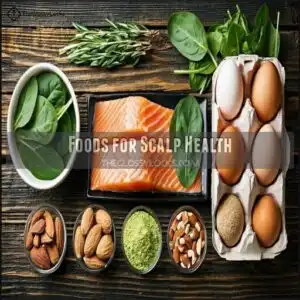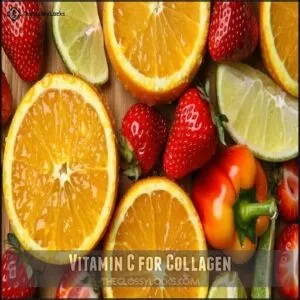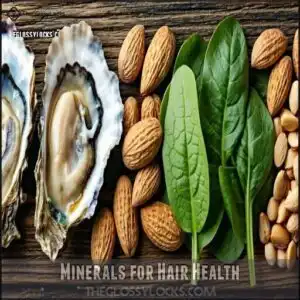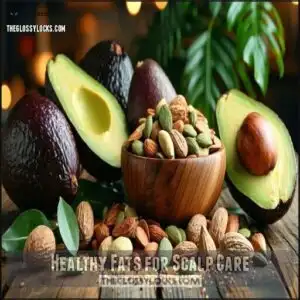This site is supported by our readers. We may earn a commission, at no cost to you, if you purchase through links.
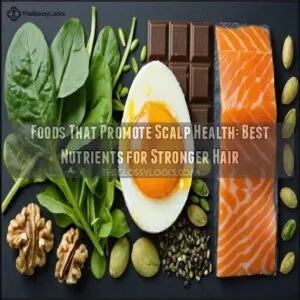
Lean proteins like chicken and eggs provide keratin-building blocks, while omega-3-rich salmon and walnuts help combat dryness and inflammation.
Spinach and kale deliver vitamins A and C, boosting sebum production and circulation.
For biotin, essential for strong hair, try egg yolks or almonds.
Selenium in whole grains and zinc in pumpkin seeds aid scalp repair, and iron-rich foods like lentils improve oxygen flow.
Even a little dark chocolate can contribute antioxidants!
Small dietary changes can work wonders—who knew dinner could double as hair care?
Table Of Contents
Key Takeaways
- Eat protein-rich foods like chicken, fish, and eggs to strengthen hair and boost keratin production.
- Add omega-3s from salmon, walnuts, or chia seeds to hydrate your scalp and reduce inflammation.
- Include vitamin-packed leafy greens like spinach for better sebum production and circulation.
- Snack on zinc and selenium-rich nuts, seeds, or whole grains to aid scalp repair and hair growth.
Foods for Scalp Health
You can support a healthy scalp by eating nutrient-rich foods that nourish your hair from the inside out.
Lean proteins, omega-3 fatty acids, egg yolks, and whole grains work together to promote a strong, hydrated foundation for hair growth.
Lean Proteins for Hair Growth
Lean proteins are essential for hair growth because they fuel keratin production, strengthen strands, and prevent breakage.
Lean proteins power keratin production, fortify strands, and guard against breakage for stronger, healthier hair.
Without enough protein, hair may weaken or even shed.
Boost your intake with these protein sources:
- Chicken and turkey for muscle building and amino acids.
- Eggs and fish to support protein synthesis.
- Legumes and nuts for plant-based options.
Omega-3 Rich Foods
Fatty fish like salmon and sardines deliver omega-3 fatty acids, which lock in moisture for healthier scalps while reducing inflammation.
Plant sources like chia seeds and walnuts are excellent, too, though they convert less efficiently to the usable form.
Scalp hydration improves shine, strengthens hair follicles, and combats dryness.
Include omega-3-rich foods regularly for stronger, more vibrant hair.
Egg Yolks for Biotin
Egg yolks are a fantastic choice for boosting scalp health.
Packed with biotin, they support your hair’s structure and strength.
Cooking eggs improves biotin absorption by deactivating avidin, making them a powerful addition to your diet.
Worried about cholesterol? Stick to moderation.
Combine eggs with other scalp health foods like leafy greens for a balanced, nutrient-packed meal!
Whole Grains for Selenium
Egg yolks aren’t the only scalp health heroes.
Whole grains like oats, quinoa, and brown rice bring selenium to the table, helping with thyroid support and, in turn, your scalp.
Aim for a variety in your daily intake, as processing impacts selenium absorption.
Including whole grains in your scalp health diet is a smart move for long-lasting hair health.
Nutrients for Hair Growth
Your hair’s strength and growth depend heavily on the right nutrients working behind the scenes.
Protein, the building block of hair, fuels keratin production through protein synthesis, making it indispensable for healthy strands.
Low iron levels can disrupt iron absorption, leading to slower growth or shedding, so stock up on iron-rich foods like red meat or spinach.
Omega-3 benefits aren’t just for your heart—they also keep your hair follicles hydrated and healthy.
As detailed on a webpage about foods for hair, leafy greens like spinach provide essential iron and vitamin A.
While the biotin debate continues, it’s clear this nutrient supports keratin, even if the results for hair growth are mixed.
Zinc for hair plays a key role in follicle repair and production, while selenium keeps your thyroid humming—just don’t overdo it, as selenium toxicity can backfire.
The right balance of these nutrients for hair growth guarantees stronger, shinier locks over time.
Vitamins for Scalp Health
You need vitamins like A, C, and E to keep your scalp healthy and support strong hair growth.
These nutrients work together to moisturize your skin, boost collagen, and protect your scalp from damage.
Vitamin a for Sebum Production
Great scalp health starts with balanced sebum production.
Vitamin A, found in foods like sweet potatoes, spinach, and liver, plays a key role by ensuring your scalp stays hydrated and nourished.
Retinol benefits include regulating oil levels and preventing clogged pores.
Without enough vitamin A, you might face a dry, flaky scalp or, oddly enough, excess oil, which can be prevented by maintaining balanced sebum production.
Vitamin C for Collagen
Strong scalp health starts with moisture and structural strength.
Vitamin C supports collagen production, which strengthens hair and maintains scalp hydration. It even helps with keratin production!
Citrus fruits, strawberries, and bell peppers are great dietary sources. Plus, its antioxidant properties protect your scalp from damage.
Don’t skip this nutrient—it’s like a bodyguard for your hair’s foundation!
Vitamin E for Antioxidant
Vitamin E offers antioxidant properties that protect your scalp from damage caused by free radicals.
It promotes better scalp health by boosting blood circulation and maintaining moisture.
Foods like almonds, sunflower seeds, and spinach are rich in this nutrient. Vitamin E products can further enhance hair health.
Aim for balanced vitamin E intake, as both deficiency and excess can upset scalp health nutrients. Balance is key!
Minerals for Hair Health
Your hair needs key minerals like zinc, selenium, and iron to stay strong and healthy.
These nutrients support keratin production, thyroid function, and oxygen delivery to your hair follicles, keeping your scalp in top shape.
Zinc for Keratin Production
Zinc plays a vital role in keratin synthesis, which keeps your hair strong.
Without enough zinc, you might face weak strands or sluggish hair growth—classic signs of zinc deficiency.
Adequate levels of zinc can also help build and repair hair tissues, but other minerals matter as well.
Boost scalp health by adding nutrient-rich foods like oysters, beef, pumpkin seeds, and chickpeas to your meals.
Just don’t overdo supplementation; too much zinc can hinder absorption of other minerals, affecting overall scalp health and potentially leading to hair growth issues.
Selenium for Thyroid Function
Did you know selenium supports thyroid hormone production, which impacts hair health and scalp condition?
Without enough selenium, you might experience dryness or shedding.
Keep your scalp happy with these picks:
- Brazil nuts—just two a day meet your needs.
- Whole grains for steady selenium intake.
- Eggs, packed with selenium, benefit hair growth and nutrition.
Iron for Oxygen Transport
After supporting thyroid health with selenium, let’s talk about iron’s role in oxygen delivery.
Without enough iron, you risk anemia, leading to tired strands and scalp issues.
Iron deficiency impacts cell growth, causing shedding.
Boost scalp health by eating iron-rich foods like spinach, lentils, or lean meats.
Pair them with vitamin C for better iron absorption and healthier hair!
Healthy Fats for Scalp Care
You need healthy fats to keep your scalp nourished and your hair strong. Foods like avocados, nuts, and seeds provide essential fatty acids that protect against dryness and irritation.
Omega-3 Fatty Acids for Inflammation
Omega-3 fatty acids are anti-inflammatory powerhouses, boosting scalp health and reducing dandruff.
Omega-3s calm inflammation, nourish follicles, and keep your scalp hydrated for strong, shiny, and resilient hair.
They’re packed into fatty fish like salmon and plant-based options like walnuts and chia seeds.
Here’s why omega-3s matter:
- Calm scalp inflammation for stronger roots.
- Nourish follicles, reducing flakiness.
- Promote elasticity, preventing breakage.
- Support shiny, vibrant strands with omega-3 for hair.
Avocados for Healthy Fats
Avocados, known for their creamy texture, deliver monounsaturated fats essential for scalp hydration.
These healthy fats for hair also reduce inflammation, making avocados great anti-inflammatory foods. Enjoy avocado benefits in healthy recipes like salads, smoothies, or spreads.
Their culinary uses are endless, and they help maintain your scalp’s natural oils, promoting better overall scalp health and stronger, shinier hair.
Nuts and Seeds for Essential Fatty Acids
If you’re looking to boost scalp health, nuts and seeds are power-packed sources of healthy fats for hair.
Almonds, walnuts, chia seeds, and flaxseeds offer key omega-3 benefits for reducing inflammation.
Snack smart but watch for nut allergies! A small handful daily gives your scalp the omega-3 for hair strength and hydration it craves—simple, delicious, effective.
Regular scalp massage techniques can further enhance hair growth.
Frequently Asked Questions (FAQs)
How does stress impact overall scalp health?
About 40% of people notice stress-related hair shedding.
Stress can mess with your scalp by reducing blood flow, leading to dryness and inflammation.
Managing stress helps keep follicles nourished and your scalp in tip-top shape.
Can caffeine consumption influence scalp circulation?
Caffeine can boost scalp circulation by stimulating blood flow to hair follicles, potentially promoting growth.
Think of it like your morning coffee waking up your scalp!
But don’t overdo it—moderation is always key.
What role does sleep play in scalp hydration?
Quality sleep helps your scalp stay hydrated by aiding the body’s natural moisture balance.
When you’re snoozing, your skin regenerates, including your scalp, which keeps it from drying out.
Skimping on sleep? Expect flaky drama!
Are fermented foods beneficial for scalp microbiome?
Don’t overlook fermented foods! They boost your scalp microbiome by introducing probiotics, balancing healthy bacteria.
Think yogurt or kimchi.
A balanced scalp microbiome reduces irritation and flakes, keeping your scalp happy and your hair thriving.
How does sugar consumption affect hair follicles?
Too much sugar can trigger inflammation, which weakens hair follicles and disrupts growth.
It may also increase scalp oiliness, inviting clogged pores.
For healthier hair, balance sweet cravings with nutrient-rich foods—your follicles will thank you, and this can lead to healthier hair overall.
Conclusion
While shampoos promise instant results, your diet offers lasting benefits for scalp health.
By choosing foods that promote scalp health—like protein-packed chicken, omega-3-rich salmon, and nutrient-dense spinach—you nourish your scalp from the inside out.
Don’t underestimate small changes, like adding biotin-rich egg yolks or zinc-filled pumpkin seeds, to support hair strength and repair.
Think of your meals as part of your hair care routine, after all, healthy hair begins where it grows—the scalp, and making these dietary choices can lead to lasting benefits.

